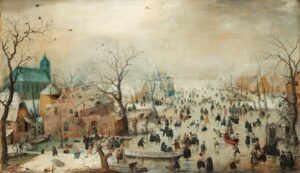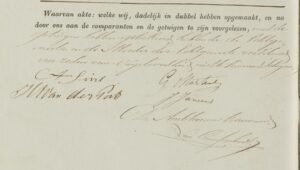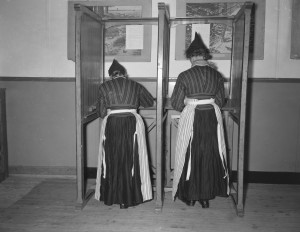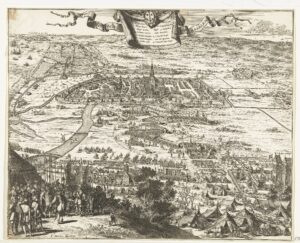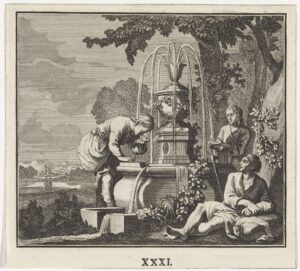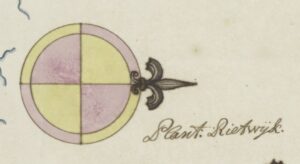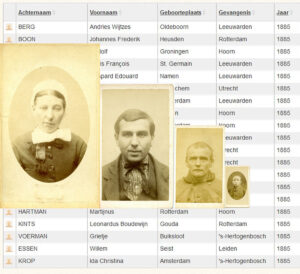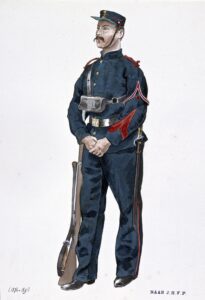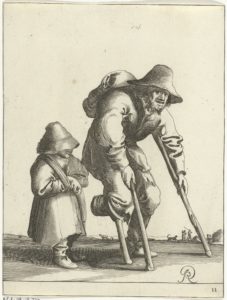The Dutch word winter means the same in English: winter. Wintertime was traditionally the time to do indoor activities, such as finishing wooden shoes, weaving, making mats, etc. In many parts of the Netherlands, it was hard to get around in the winter since the roads were too boggy. As soon as it was cold enough for the ice to become reliable, many people used frozen creeks to get around, either on skates or on sleds. … [Read more...]
Dutch term – Voornoemd
In records, you sometimes see a reference to someone, "voornoemd." That means "aforesaid," the same person as mentioned before. For example, the beginning of the record may introduce Jan Jansen as the guardian of Janna Derksen. Further on in the record they may refer to "Jan Jansen, voornoemd," which refers to the Jan Jansen that was already introduced. … [Read more...]
Dutch term – Verklarende niet te kunnen schrijven
In civil registration records, the informants of birth and death records and the bride and groom and their parents in marriage records, as well as the witnesses, are asked to sign the record. If the people were illiterate, this will be noted in the final sentences of the record. Often you will see a sentence like "verklarende de moeder van de bruidegom uit hoofde van ongeleerdheid niet te kunnen schrijven" [the mother of the groom declares not to be able to sign, as not having learned … [Read more...]
Dutch term – Stemmen
Stemmen means to vote. In the Netherlands, the right to vote was originally tied to owning property or personal wealth. It took until 1917 for all men to be allowed to vote. Women had to wait until 1919. … [Read more...]
Dutch term – Beleg
A beleg is a siege. During the Eighty Years' War (1568-1648), many cities were besieged by either Dutch or Spanish troops. In several cases, whole cities were burned to the ground, an in some cases the population was massacred. Read Five Ways the Eighty Years War Affected Your Ancestors for more information. … [Read more...]
Dutch term – Bron
Bron is the Dutch term for "source." The word also means "spring," in the meaning of a place where water naturally comes to the surface. … [Read more...]
Dutch term – Noord, Oost, Zuid, West
Oost-West [East-West] is the theme of the History Month in the Netherlands this year. The Dutch terms for the cardinal directions are: noord north oost east zuid south west west You may encounter these terms in deeds, where the location of the property is described in terms of its neighbors to the north, east, south, and west. They are also used in geographical names, like Zuid-Holland [South Holland] or Noord-Brabant [North Brabant]. … [Read more...]
Source – Secret Register of Released Prisoners
A source with an intriguing name is the "Geheim Register van Ontslagen Gevangen" or the Secret Register of Released Prisoners. This register was kept from 1882 to 1896 and included the photos, personal details, and overview of crimes of the prisoners who would be released in the upcoming month even though they were still considered dangerous. This included people who served multiple sentences, or who served a long sentence for a serious crime. … [Read more...]
Dutch term – Marinier
A marinier is a marine. Muster rolls for marines from the period 1813-1940 can be found at the National Archives in The Hague. Some of the records were lost in World War II. The surviving records have been indexed (see "Marine"). See Finding your Maritime Ancestors for more information. … [Read more...]
Dutch term – Armenzorg
Armenzorg means "care for the poor." You can often find it as a topic in finding aids. See poor relief in the Netherlands in the 1600s for background information about this subject. … [Read more...]
